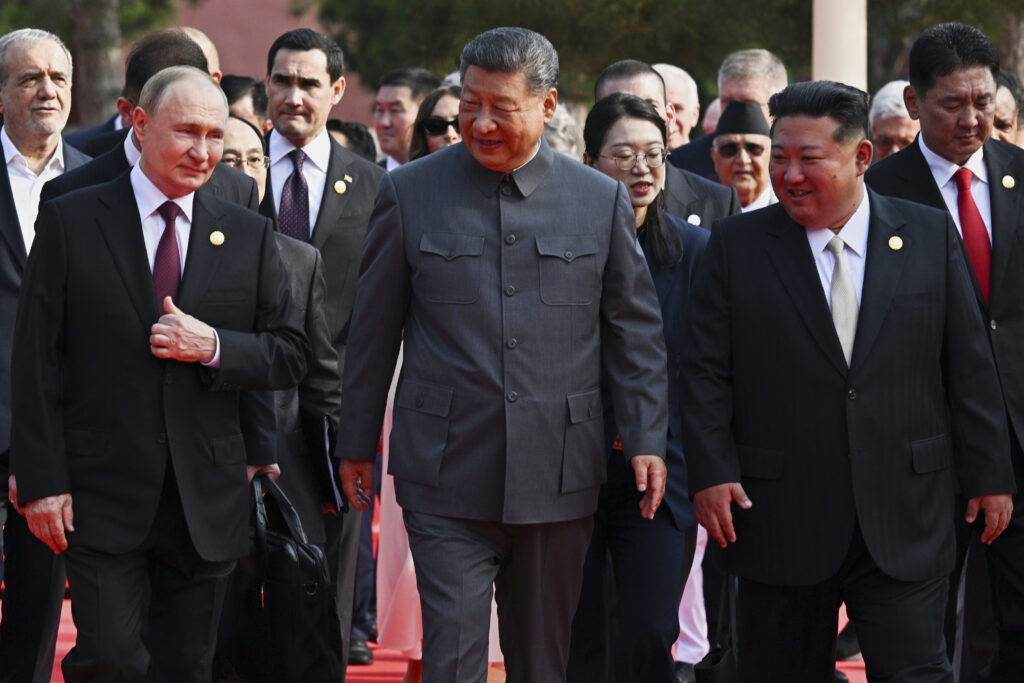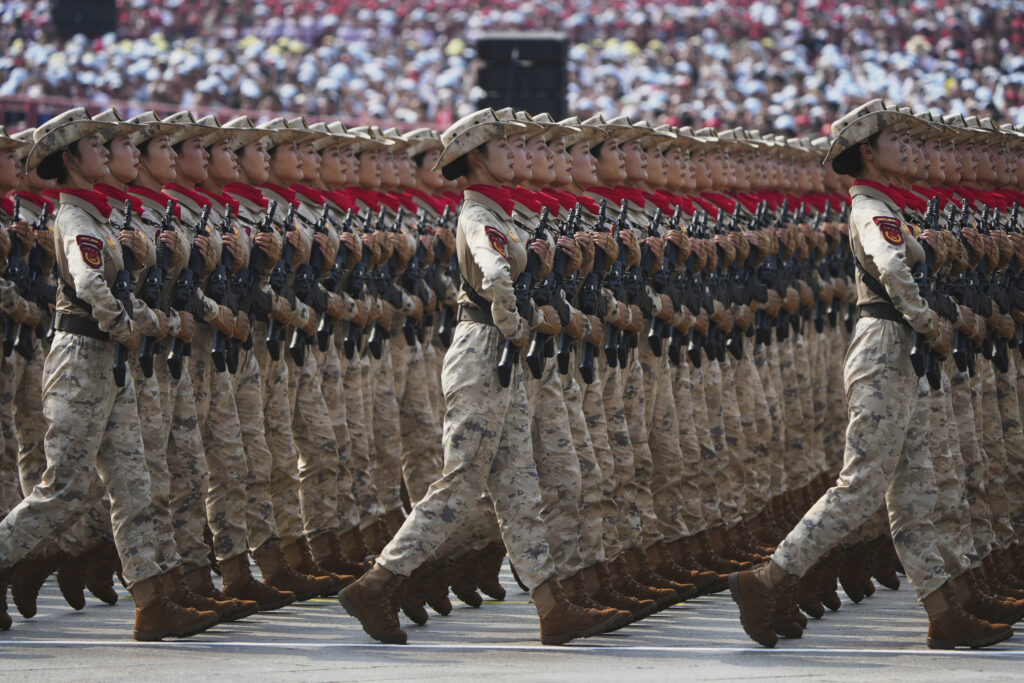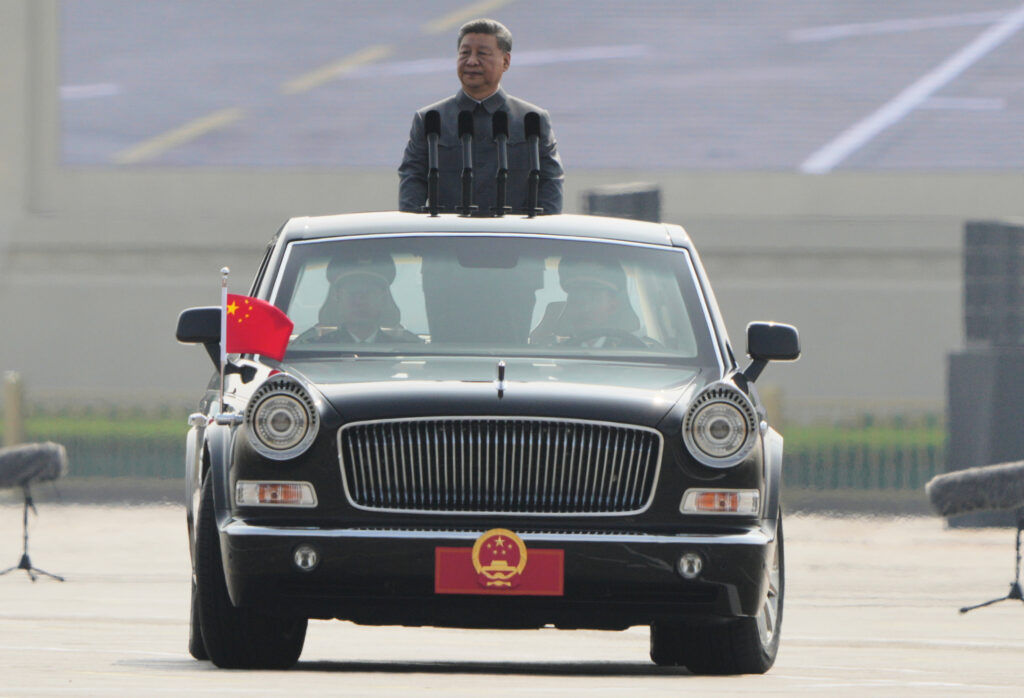Behind Beijing’s Victory Parade, Russia Kowtows to China
Despite Trump’s vow ‘to un-unite them,’ the two authoritarian superpowers are joined at the hip economically, militarily, and politically.

Images of Russia’s Vladimir Putin and Communist China’s Xi Jinping walking side by side today into Tiananmen Square may dispel dreams held by some Trump supporters of a 1960s-style Sino-Soviet split, or a 1970s-style Nixon-in-China moment for President Trump. Just before his election last year, Mr. Trump vowed of Russia and China: “I’m going to have to un-unite them, and I think I can do that, too.”
Today, Russia and China seem too entangled economically, militarily, and politically for a spat over ideology or personality. Since Russia’s full-bore invasion of Ukraine in 2022, China has become Russia’s top trading partner. China’s renminbi has become the most heavily traded currency at Moscow. Russia has bought so many Chinese cars that China has displaced Japan as the world’s largest car-exporting nation.
With one of the world’s longest land borders — 2,615 miles — and Chinese government agencies printing maps of the Russian Far East with historic Chinese names, Russians want to know that, for now, their backs are covered in Siberia. Not by accident, Mr. Putin was the first among the 26 world leaders to arrive for the Beijing gathering, dubbed the “Axis of Upheaval.” Spending a rare four days outside of Russia, Mr. Putin may be Mr. Xi’s last guest to leave.

Mr. Putin, making his 21st visit to China during his 25 years as Russia’s leader, was welcomed by Mr. Xi as “old friend.” The Chinese leader said China-Russia relations have “withstood the test of changing international circumstances.”
There is a great imbalance between the world’s two largest authoritarian powers. In 1991, at the end of communism in Russia, the Russian economy was 50 percent larger than China’s. Since then, China’s economy has grown to become eight times the size of Russia’s.
On one level, China and Russia are a match made in heaven. Russia, one of the world’s largest energy exporters, is next door to China, the world’s largest oil and gas importer. Yesterday, the synergy between these two neighbors was on display at the signing of a memorandum to build the world’s most expensive pipeline, Power of Siberia 2. This 4.5-foot pipeline is to carry Arctic gas 1,700 miles south through Mongolia, to the deserts of Xinjiang, China.
Russia’s state gas-exporting monopoly, Gazprom, signed the first memorandum 20 years ago. Since then, the stumbling block has been price. The Kremlin has long resisted China’s demand to buy gas at Russia’s domestic price — as little as 10 percent of Russia’s export price.

Yesterday Gazprom’s chief executive, Alexei Miller, announced a “legally binding memorandum” for construction, predicting that the pipeline could ship as much as 50 billion cubic meters a year for 30 years. He declined to cite a price, saying only that it would be lower than the one previously charged European customers. Some reports say it is near Russia’s domestic price.
Glossed over in the triumphalism is that due to sanctions and explosions, Russia lost its most lucrative gas market, Europe. Before Russia’s 2022 invasion of Ukraine, Europe imported 150 billion cubic meters of gas every year.
Over the last two weeks, three waves of Ukrainian missile strikes severely damaged Russia’s last functioning east-west oil pipeline. Known as Druzhba, or Friendship, this Soviet-era pipeline supplies oil to Russia’s last European Union pipeline customers — Hungary and Slovakia.
Reflecting how China ignores European and American sanctions on Russia, official news agency Xinhua yesterday said that more than 20 agreements were signed with Russia on topics ranging from energy to aerospace to artificial intelligence. One deal is for cooperation between Gazprom and China National Petroleum Corporation.

Emblematic of tightening ties, China’s foreign ministry says that on September 15 it will start allowing Russians to visit China without visas. This could boost tourism and business trips by 40 percent, the Association of Tour Operators of Russia estimates. Blocked from visiting many Western countries, 1.6 million Russians visited China last year, more than double the 2023 number.
With bilateral trade booming, people-to-people contacts are multiplying. Demand for Mandarin-speaking nannies has soared at Moscow. A popular Russian job website, SuperJob, reports a surge in demand for Chinese-speaking applicants.
One underside of the goods trade is an illicit and barely camouflaged export of parts from China that are used in Russia to make drones, tanks, and other military gear. Reuters reported in July that Chinese-made drone engines are being shipped via front companies to Russia, labelled as “industrial refrigeration units.” Ukrainian military intelligence posts online a list of more than 300 Chinese parts used in Russia military drones and missiles.
Officially, China is neutral. That does not mean it wants Russia to lose, though. In a meeting at Brussels in July, China’s foreign minister, Wang Yi, told the European Union’s top diplomat, Kaja Kallas, that Beijing cannot afford a Russian loss in Ukraine because it fears the United States would then shift its focus to Beijing, the South China Morning Post reported from Brussels.
“A war that bloodies, but does not beat Russia is China’s obvious favorite choice,” a Rutgers University professor, Alexander J. Motyl, writes in the Hill. “A weak Russia implicated in an unwinnable war would be chastised but still exist as Beijing’s vassal and have no alternative to kowtowing to its Chinese overlord. That kind of Russia suits China perfectly.”

